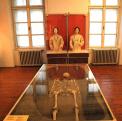2025. July 8. Tuesday
Balaton Museum - Keszthely
|
|
Address: 8360, Keszthely Múzeum u. 2.
Phone number: (83) 312-351, (83) 511-335
E-mail: titkarsag@balatonimuzeum.hu
Opening hours: 01.09-31.10.: Tue-Sat 10-17, 01.11-30.: Tue-Sat 10-16
|
The exhibition has closed for visitors.
2009.10.04. - 2010.05.31.
Museum tickets, service costs:
|
Ticket for adults
|
800 HUF
|
/ capita
|
|
Group ticket for adults
(min. 8 people)
|
600 HUF
|
/ capita
|
|
Ticket for students
|
400 HUF
|
/ capita
|
|
Ticket for pensioners
|
400 HUF
|
/ capita
|
|
Ticket for families
(2 adults + min. 2 children)
|
400 HUF
|
/ capita
|
|
Combined ticket
(I PROGRAMME PACKAGE: ticket + guided tour at the permanent exhibition + museum pedagogy activity for student card holders over 10 people )
|
750 HUF
|
|
|
Combined ticket
(II PROGRAMME PACKAGE: ticket + guided tour at the permanent exhibition + museum pedagogy activity + arts and crafts activity over 10 people )
|
1450 HUF
|
|
|
Guide
(on prior notice)
|
4500 HUF
|
The seasonal exhibition summarizes a 3-year-long German-Hungarian research project which has results extending more disciplines of science.

In the focus of the exhibition stands the late Roman fortress and its subsequent settlements. Visitors can get to know the results of excavations in the area of fortress that had begun 125 years ago. The archaeo-botanical relics make the reconstruction of Iron and Roman Age plant cultivation possible. Geological researches throw light on the changing of water-level of Lake Balaton and its influence on the environment. Around the fortress more than 1000 graves have been found so far, and their anthropological examination displays the specification of deads' gender, age, origin and even nutrition.
In addition the site of Fenékpuszta is the centre of so-called "Keszthely Culture" from the migration period. The exhibition deals with high priority with the history and material heritage of population from 5-7th centuries A.D., which reflects late antique and Christian traditions.
In the last room the curators are putting the question, if Keszthely-Fenékpuszta could become an archaeological park. The solution of the problem can be easier on the basis of Western European examples and researches until now.

In the focus of the exhibition stands the late Roman fortress and its subsequent settlements. Visitors can get to know the results of excavations in the area of fortress that had begun 125 years ago. The archaeo-botanical relics make the reconstruction of Iron and Roman Age plant cultivation possible. Geological researches throw light on the changing of water-level of Lake Balaton and its influence on the environment. Around the fortress more than 1000 graves have been found so far, and their anthropological examination displays the specification of deads' gender, age, origin and even nutrition.
In addition the site of Fenékpuszta is the centre of so-called "Keszthely Culture" from the migration period. The exhibition deals with high priority with the history and material heritage of population from 5-7th centuries A.D., which reflects late antique and Christian traditions.
In the last room the curators are putting the question, if Keszthely-Fenékpuszta could become an archaeological park. The solution of the problem can be easier on the basis of Western European examples and researches until now.
